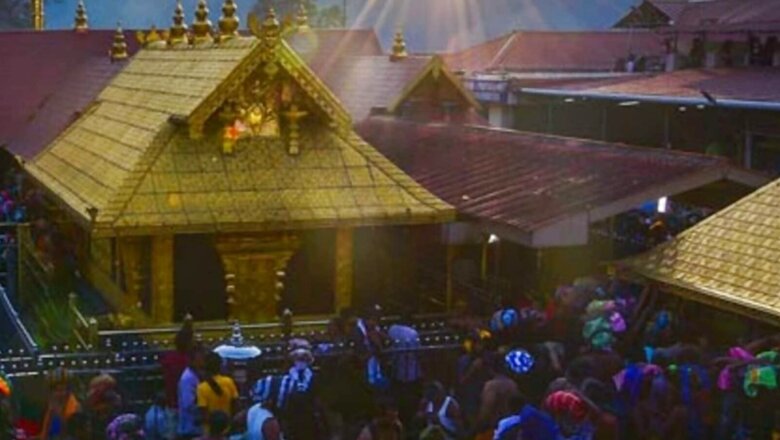
views
Authorities at the Lord Ayyappa Swamy temple at Kerala’s Sabarimala have alleged that there was “malicious intention” behind claims of the use of ‘halal’ jaggery in the preparation of prasadam for pilgrims at the famous shrine after Kerala High Court sought a report on the matter following a petition by a member of an umbrella group of Hindu organisations. As the high court awaits sought further reports in the case, here’s what you need to know.
What Are The Prasadams Served At The Sabarimala Hill Shrine?
‘Appam’ and ‘Aravana’ are the two types of prasadam distributed to devotees at the Lord Ayyappa Swamy temple at Sabarimala in Kerala’s Pathanamthitta district. ‘Appam’ is a sweet item made of rice and jaggery while ‘aravana’ is a kind of a thick rice payasam that includes jaggery. Reports say that the revenue from the sale of these two accounts for more than 50 per cent of the temple’s earnings in the annual pilgrimage season, which lasts for close to two months.
What Are The Allegations Regarding Use Of Halal Jaggery?
SJR Kumar, the general convener of the Sabarimala Action Committee — a group formed after the 2018 Supreme Court judgment permitting entry of women of all ages into the temple — alleged in a petition in Kerala High Court that the Travancore Devaswom Board (TDB), which manages temple affairs, was using halal-certified jaggery in the preparation of prasadam at Sabarimala.
The petitioner said that ‘halal’ items could not be used at the temple since they are “not a Satwik/pure material” and that the actions of the temple administration were “highly illegal and violative of the religious rights guaranteed under the Constitution”.
“It is highly disheartening to see that the food materials prepared following the rituals and religious practices of another religion with its certification is accepted as food material for the preparation of Naivedyam/Prasada in a Hindu temple having its own rituals and customs,” Kumar, a former president of Kerala unit of the Viswa Hindu Parishad (VHP), said in the petition.
What Did Sabarimala Temple Authorities Tell High Court?
After the Kerala HC, acting on the petition, sought a report from temple authorities on the matter, the TDB responded by saying that the allegations made by the petitioner were “absolutely false, baseless and are made purposefully with the malicious intention” to hamper the sale of prasadams during the pilgrimage season.
TDB explained that ‘halal’ — an Arabic word that translates as “permissible” in English — mentioned on the jaggery packaging was due to the fact that the company frrom which the said consignment was obtained also exported jaggery to Arab countries, where the rules mandate the sale of halal foods per Islamic rules.
“In 2018, a Maharashtra-based company supplied jaggery for Sabarimala. The firm was engaged in exporting jaggery and these export bags mentioned halal certification. As those bags were found to be of inferior quality, we had not used that supply at the temple. The allegation is baseless and we will take legal action against the campaign,” said K Ananthagopan, the TDB president and a state committee member of the ruling CPI(M) in Kerala.
“There is a calculated attempt to attack the reputation of Sabarimala and to hurt the religious feelings of the pilgrims in order to destroy the communal harmony through various posts published and circulated in the social media,” TDB said. It also stated that a complaint in this regard has been given to the Sannidhanam police station inside the temple complex.
The ‘appam’ and ‘aravana’ are being prepared using the fresh supplies of jaggery, TDB told the high court, adding that the jaggery procured for making prasadam is first tested by relevant temple authorities and food safety officials before its use. The ‘vazhipadu’ (offerings) prepared from jaggery, too, are tested before distribution to devotees.
TDB said a contract for supplying jaggery during 2019-20 was given to Vardhan Agro Processing Ltd From Satara in Maharashtra and the company had supplied 19.96 lakh kg of jaggery from Mandala Makaravilakku festival (mid-November to mid-January) till Chithira Attavisesham (the one-day festival marking the birth anniversary celebration of Chithira Thirunal Balarama Varma, the last ruler of the erstwhile Travancore kingdom) during that period. During that season 16.59 lakh kg of jaggery was used.
But since the restrictions put in place due to Covid-19 had led to a drop in footfall at the temple, TDB said, there was also a dip in the requirement for prasadam, in view of which the remaining jaggery of around 3.36 lakh kg ended up being stored at Sannidhanam for a long period.
Afterwards, a contract for supplying jaggery in 2020-21 was given to Maharashtra-based SP Sugar and Agro Pvt Ltd, which started supplying it from April 2021, and till now has supplied 5 lakh kg of jaggery out of which 2.76 lakh kg has been taken to the main store at Sabarimala, TDB said.
In April this year, the older jaggery stock at Sannidhanam was tested and its quality was found to be satisfactory.
However, when it was tested again in September it was found unsuitable for human consumption and thereafter, was auctioned off to Thrissur-based Southern Agro Tech India Pvt Ltd for making cattle feed, it said.
Read all the Latest India News here



















Comments
0 comment